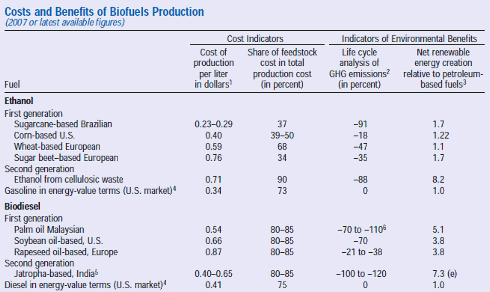 This is the first of three posts I intend to make which draw from the October 2007 IMF World Economic Outlook. While I don't suggest reading it in its 275 page entirety (even I can't do so), it does contain a lot of important material. Here's the first installment courtesy of the Wall Street Journal reporting on the IMF's findings on biofuels. The data is drawn from box 1.6 of the report on pp. 48-51. In the past, I've already featured the anti-globalization movement and the UN's concerns about the use of biofuels, most of which pertain to the substitution of food for fuel causing food price rises. There have even been stories I've featured describing how Colombian terrorists are grabbing land to plant biofuels and Mexican tequila shortages as biofuel production ramps up.
This is the first of three posts I intend to make which draw from the October 2007 IMF World Economic Outlook. While I don't suggest reading it in its 275 page entirety (even I can't do so), it does contain a lot of important material. Here's the first installment courtesy of the Wall Street Journal reporting on the IMF's findings on biofuels. The data is drawn from box 1.6 of the report on pp. 48-51. In the past, I've already featured the anti-globalization movement and the UN's concerns about the use of biofuels, most of which pertain to the substitution of food for fuel causing food price rises. There have even been stories I've featured describing how Colombian terrorists are grabbing land to plant biofuels and Mexican tequila shortages as biofuel production ramps up.The IMF's concern, however, is simpler: As we've heard time and time again, biofuels are not a cost-effective energy source overall. According to the IMF, the only biofuel energy source that currently compares favorably with gasoline is...[drum roll please] Brazilian sugarcane. That said, note that fuel prices were estimated at $65/bbl. As you are all aware, we are well past that point, so some of these other biofuel technologies may become viable in comparison, especially if and when economies of scale begin to take effect:
Brazil's sugar-cane-based ethanol is the only form of ethanol that is generally cheaper to produce than gasoline, according to an International Monetary Fund analysis, boosting Brazil's plans to make itself a fuel powerhouse and undermining U.S. corn growers' efforts to present themselves as price competitive.The analysis, part of IMF's semiannual World Economic Outlook, also said none of the current crop of biodiesels can compete on price with conventional diesel, except perhaps for a biodiesel being developed from India's drought-resistant jatropha tree.
The report is likely to exacerbate the food-versus-fuel debate, which pits ethanol supporters against development experts and many in the food industry who complain that using grains for fuel has played a role in increasing the price of staples such as meat and cereal...
As part of the report, the IMF compared costs and environmental benefits of different ways of making ethanol and biodiesel. Sugar-cane-based Brazilian ethanol was at least 15% cheaper to produce than gasoline, the report said, while corn-based U.S. ethanol was 18% more expensive than gasoline. Sugar-beet-based European ethanol was twice as expensive to make as gasoline, as was ethanol made from cellulosic waste. The latter is in early stages of development. Sugar-cane ethanol and cellulosic ethanol also had far fewer greenhouse emissions, per kilometer traveled, than corn ethanol.
For its study, the IMF assumed oil was trading at $65 a barrel -- about the average for 2007 but 34% lower than today's closing price -- and that crops were trading at the average price for the first half of the year.
"We're not saying that corn alone is the answer," said Matt Hartwig, a spokesman for the Renewable Fuels Association, a U.S. ethanol trade group. But he said the U.S. is learning to develop more efficient home-grown fuel, such as cellulosic ethanol. The Agriculture Department expects ethanol to account for 30% of the corn crop by 2010, up from about 14% last year.
The IMF didn't estimate the price of oil required for corn ethanol to be cheaper to produce than gasoline. But Valerie Mercer-Blackman, a senior IMF economist, noted that whatever the price of oil, sugar-cane ethanol maintained a price advantage over corn ethanol because it requires fewer production steps than corn ethanol.
It's a bit unfortunate that the WSJ excluded the part of the report which compares reductions in greenhouse gas emissions of various biofuel technologies, so I've put the relevant table below. Even after considering GHG, Brazilian sugarcane comes out ahead:

Lastly, the IMF has a related commentary on "the dilemma of biofuels" that makes a good summary of the international political economy issues behind biofuels:
Using biofuels to supplement transportation fuels at modest blends—under current technology—has its pros and cons. Biofuels can supplement traditional fuels while contributing to rural development. However, until new technologies are developed, using food to produce biofuels might further strain already tight supplies of arable land and water all over the world, thereby pushing food prices up even further.
Realizing the potential benefits of biofuels requires better policies. Brazilian ethanol derived from sugarcane, for example, is less costly to produce than corn-based ethanol in the United States, and also yields greater environmental benefits. However, generous tax credits for blenders, tariffs on imported biofuels, and agricultural support for grain farmers in the United States and the EU make it difficult for low-cost foreign biofuel producers to compete in these markets.
If tariffs and subsidies in the United States and EU were eliminated, biofuels would likely be produced largely by lower-cost producers such as Brazil and other Latin American countries. Similarly, under such a scenario, biodiesel would be produced mostly by Malaysia, Indonesia, India, and some African countries.
In sum, while we wait for more efficient fuel technologies to emerge, the first-best policy would be to allow free trade in biofuels. This would benefit the environment as well as make biofuel economically more viable.

